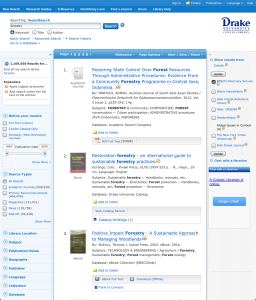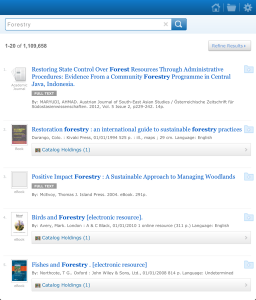Personal context: Your author is Andrew Welch, Librarian for the Integrated Library System at Cowles Library. I was recently hired to—among other things—assess and oversee the library management system (the software that stores and provides access to our collections and knowledge base). Before coming to Drake, I was a Systems Librarian for the Aurora Public Library system in Colorado.
While access to information is expanding, it is also completing a circle of sorts. In the 60s, information was stored on large mainframes, which by the early 1970s were accessed by individual, specialized terminals. The advent of the personal computer compartmentalized our knowledge base as users began to store information locally on their own machines.
Recently, with the increasing popularity of computing “in the cloud” (think Google Docs instead of Microsoft Office, or Flickr instead of a flash drive), the information pool is recentralizing, with anytime/anywhere retrieval and sharing from virtually unlimited points of access. The cloud is essentially a global mainframe.
Our recent implementation of SuperSearch is cloud-based computing at work. Ebsco Publishing (the vendor behind SuperSearch) continually harvests and indexes bibliographic and article-level data from hundreds of individual databases—including our own catalog of books and journals and our institutional repository—and stores those data in a single repository. Discovery tools like SuperSearch are breaking down technological barriers to information by streamlining our access to multiple resources of knowledge.
One of the driving forces behind the growing popularity of cloud-based computing is the tremendous growth of Web-enabled mobile device usage. These devices are getting smaller, faster and increasingly more multi-functional. Industry analysts predict that the number of mobile devices accessing the Internet will outpace desktop computers in the next few years.
Users—particularly millennials—have grown accustomed to anytime, anywhere access to data and services that until recently were only available in a single physical space. Physical barriers to information access are dissolving; no longer is it necessary to visit the library (though we love it when you do!) to retrieve information from numerous resources.
Cowles has offered Cowles Mobile, a mobile web interface, since 2009, and we have recently expanded the available content to include a number of databases and a more mobile-friendly version of SuperSearch.
Look for other cloud-based library services in the near future, including a knowledgebase and forum for getting answers to your research questions, as well as a more full-featured set of subject- and course-specific resource guides.


